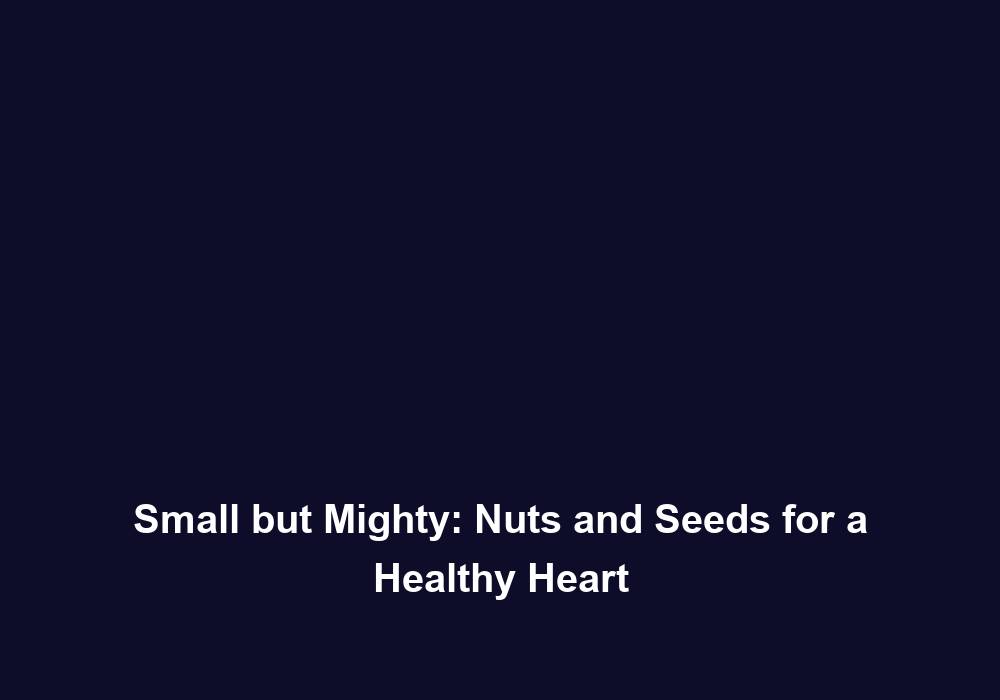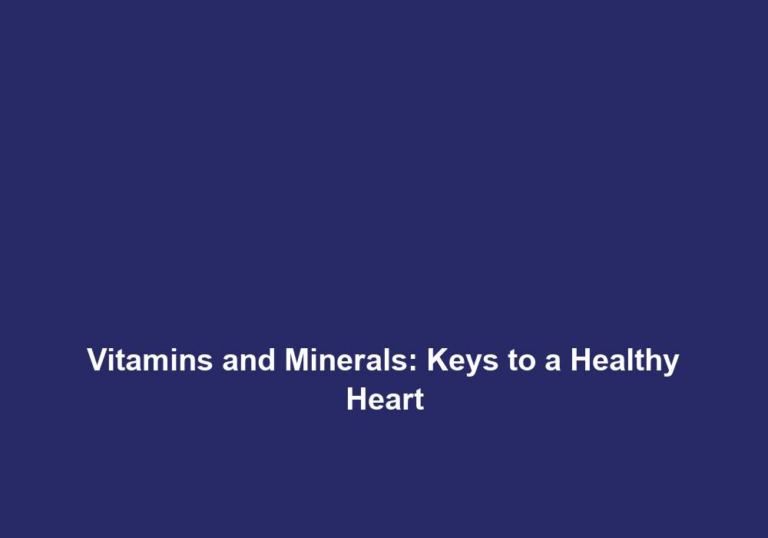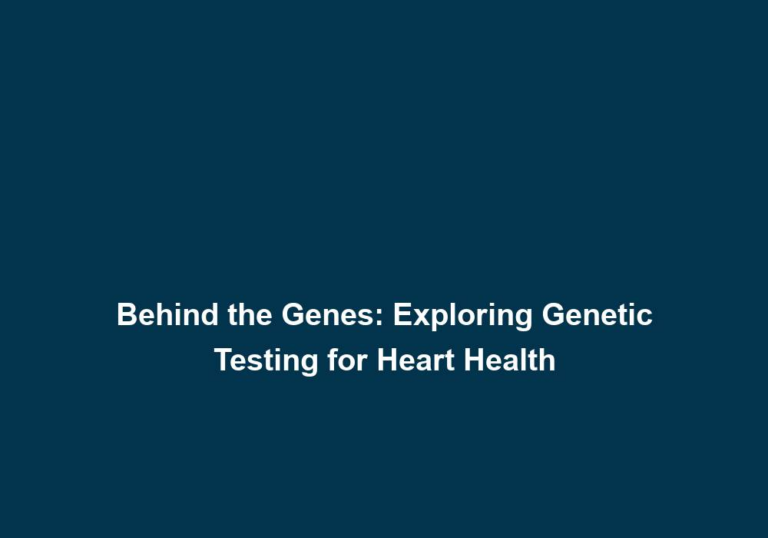Small but Mighty: Nuts and Seeds for a Healthy Heart
Nuts and seeds are often overlooked when it comes to heart-healthy foods. However, these small powerhouses are packed with essential nutrients that can significantly benefit your cardiovascular health. Incorporating nuts and seeds into your diet can lower the risk of heart disease, promote healthy cholesterol levels, and provide an array of other valuable health benefits. So, let’s delve into the world of nuts and seeds and discover why they are small but mighty for a healthy heart.
The Nutritional Powerhouses
1. Omega-3 Fatty Acids
Nuts and seeds are an excellent source of heart-protective omega-3 fatty acids. Omega-3s have been linked to a lower risk of heart disease by reducing inflammation, improving blood vessel health, and lowering blood pressure. Some of the best sources include:
- Walnuts: Walnuts are not only rich in omega-3 fatty acids but also contain antioxidants and fiber. These nutrients work together to improve cholesterol levels and reduce the risk of heart disease. Enjoy a handful of walnuts as a snack or sprinkle them over salads and yogurt.
- Flaxseeds: Flaxseeds are a plant-based source of omega-3 fatty acids, fiber, and lignans. Lignans are beneficial compounds that can reduce inflammation and improve heart health. To enjoy the nutritional benefits, grind flaxseeds and add them to cereals, smoothies, or use them as an egg substitute in baking.
- Chia Seeds: Chia seeds are a nutritional powerhouse, packed with omega-3 fatty acids, fiber, and antioxidants. They can help reduce inflammation, regulate blood sugar levels, and improve heart health. Sprinkle chia seeds over yogurt, salads, or make a delicious chia pudding for a heart-healthy snack.
2. Fiber
Fiber plays a crucial role in maintaining heart health. Nuts and seeds are rich in dietary fiber, which helps lower cholesterol levels, reduce the risk of heart disease, and regulate blood sugar levels. Some specific nuts and seeds high in fiber include:
- Almonds: Almonds are not only a great source of fiber but also contain monounsaturated fats and vitamin E. These nutrients work together to improve cholesterol levels, reduce the risk of heart disease, and provide antioxidant benefits. Enjoy a handful of almonds as a snack or sprinkle them over salads and yogurt.
- Pistachios: Pistachios are another fiber-rich nut that can benefit heart health. They also contain antioxidants and healthy fats that can help improve cholesterol levels and reduce the risk of heart disease. Enjoy pistachios as a snack or add them to your favorite recipes for added crunch and nutritional value.
- Sunflower Seeds: Sunflower seeds are not only high in fiber but also a good source of vitamin E, magnesium, and phytosterols. Vitamin E is a powerful antioxidant that protects the heart from damage, while magnesium and phytosterols help lower cholesterol levels. Enjoy sunflower seeds as a snack, or sprinkle them over salads and soups.
3. Antioxidants
Nuts and seeds are packed with antioxidants that protect the heart from oxidative stress caused by free radicals. These antioxidants help prevent the buildup of plaque in the arteries, reducing the risk of heart disease. Some examples of antioxidant-rich nuts and seeds include:
- Pecans: Pecans are not only delicious but also a great source of antioxidants. They contain compounds such as ellagic acid and vitamin E, which help reduce inflammation and protect against heart disease. Enjoy pecans as a snack or incorporate them into your favorite recipes for added flavor and nutrition.
- Hazelnuts: Hazelnuts are another nut rich in antioxidants, particularly vitamin E. These antioxidants help protect the heart from damage and reduce the risk of heart disease. Enjoy hazelnuts as a snack or add them to your baked goods for a heart-healthy boost.
- Sunflower Seeds: As mentioned earlier, sunflower seeds are packed with antioxidants that protect the heart from oxidative stress. Enjoy them as a snack, or sprinkle them over salads and soups for added crunch and nutritional value.
4. Plant Sterols
Certain nuts and seeds contain plant sterols, which are natural compounds that can help lower LDL (bad) cholesterol levels. By blocking the absorption of cholesterol in the intestines, plant sterols help reduce the risk of heart disease. Some notable sources of plant sterols include:
- Almonds: Almonds not only provide fiber but also contain plant sterols. These compounds work together to improve cholesterol levels and reduce the risk of heart disease. Enjoy a handful of almonds as a snack or incorporate them into your favorite recipes for added nutrition.
- Pumpkin Seeds: Pumpkin seeds are not only rich in heart-healthy magnesium and omega-3 fatty acids but also contain plant sterols. These compounds help lower cholesterol levels and promote heart health. Snack on roasted pumpkin seeds or add them to your trail mix for a heart-healthy boost.
- Sesame Seeds: Sesame seeds are another source of plant sterols that can benefit heart health. They also provide fiber, healthy fats, and other essential nutrients. Enjoy sesame seeds in your cooking or sprinkle them over salads and stir-fries for added flavor and nutrition.
Specific Nut and Seed Choices for Heart Health
1. Almonds
Almonds are a heart-healthy choice due to their high monounsaturated fat content, fiber, and vitamin E. They have been shown to improve cholesterol levels and reduce the risk of heart disease. Enjoy a handful of almonds as a snack or sprinkle them over salads and yogurt.
2. Walnuts
Walnuts are rich in omega-3 fatty acids, antioxidants, and fiber. Multiple studies have demonstrated that incorporating walnuts into your diet can improve heart health by reducing LDL cholesterol levels and lowering blood pressure. Add walnuts to your oatmeal, smoothies, or include them in your baked goods.
3. Flaxseeds
Flaxseeds are a great plant-based source of omega-3 fatty acids, fiber, and lignans. Lignans are beneficial compounds that can reduce inflammation and improve heart health. To enjoy the nutritional benefits, grind flaxseeds and add them to cereals, smoothies, or use them as an egg substitute in baking.
4. Chia Seeds
Chia seeds are a nutritional powerhouse, packed with omega-3 fatty acids, fiber, and antioxidants. They can help reduce inflammation, regulate blood sugar levels, and improve heart health. Sprinkle chia seeds over yogurt, salads, or make a delicious chia pudding for a heart-healthy snack.
5. Pumpkin Seeds
Pumpkin seeds are an excellent source of heart-healthy magnesium, zinc, and omega-3 fatty acids. They can help lower blood pressure, reduce LDL cholesterol levels, and improve heart health. Snack on roasted pumpkin seeds or add them to your trail mix for a heart-healthy boost.
6. Sunflower Seeds
Sunflower seeds are rich in vitamin E, magnesium, and phytosterols. Vitamin E is a powerful antioxidant that protects the heart from damage, while magnesium and phytosterols help lower cholesterol levels. Enjoy sunflower seeds as a snack, or sprinkle them over salads and soups.
Incorporating Nuts and Seeds into Your Diet
Now that you understand the incredible heart-healthy benefits of nuts and seeds, it’s time to incorporate them into your daily routine. Here are some simple ways to enjoy these nutritional powerhouses:
- Snack on a handful of mixed nuts or seeds between meals. Choose a variety of nuts and seeds to get a diverse range of nutrients.
- Add chopped nuts or seeds to yogurt, oatmeal, or cereal for added crunch and nutritional value. Try different combinations to find your favorite flavor combinations.
- Include nuts and seeds in your baking recipes, such as cookies, muffins, or bread. Replace some of the flour with ground nuts or seeds for added texture and nutrition.
- Sprinkle flaxseeds or chia seeds over salads, soups, or stir-fries. They add a pleasant crunch and boost the nutritional value of your meals.
- Blend nuts or seeds into smoothies for a nutritious and filling boost. Experiment with different combinations to find your favorite flavor profiles.
- Make homemade nut butter using your favorite nuts and enjoy it on whole-grain toast or sliced fruit. This way, you can control the ingredients and avoid added sugars or preservatives.
Remember to consume nuts and seeds in moderation, as they are calorie-dense. A small portion (about a handful) per day is sufficient to reap their heart-healthy benefits without excess caloric intake.
In conclusion, nuts and seeds are small but mighty when it comes to promoting heart health. With their abundance of omega-3 fatty acids, fiber, antioxidants, and other essential nutrients, incorporating them into your diet can protect against heart disease, improve cholesterol levels, and enhance overall cardiovascular well-being. So, grab a handful of these nutritional powerhouses and give your heart the love it deserves!







